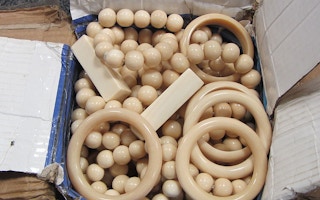In a historic move, 49 Hong Kong lawmakers voted on Jan. 31 to end all domestic ivory trade by 2021 and passed the Endangered Species of Animals and Plants (Amendment) Bill 2017, also called the Hong Kong Ivory Ban Bill. Only four legislators voted against the ban.
The overwhelming vote comes just a month after China shut down all of its ivory markets and factories on the mainland. The new ivory ban bill also increases penalties for wildlife crimes.
“Today’s decision is another milestone for the conservation of elephants, and should serve as further encouragement for governments in the region to put an end to the domestic ivory markets that fuel the poaching crisis,” James Compton, senior program director for wildlife trafficking watchdog TRAFFIC in Asia Pacific, said in a statement. “Hong Kong’s legislators should be congratulated for choosing to stand on the right side of history.”
Hong Kong, one of the world’s largest ivory markets, is a signatory to the Convention on International Trade in Endangered Species of Wild Fauna and Flora (CITES). In 1989, CITES banned international trade in elephant ivory by placing elephants on Appendix I.
“
Close regulation and monitoring is essential to prevent any laundering of ivory to the still open markets in Hong Kong.
Tom Milliken, elephant and rhino program leader, TRAFFIC
The convention did not mandate the closure of domestic markets, though. So Hong Kong continued to allow ivory imported before 1976 (pre-convention or before CITES was established) or before 1990 (pre-ban ivory) to be legally traded. However, traders have been using loopholes within Hong Kong’s laws to re-stock their “legal” ivory stockpiles with illegal ivory from recently poached elephants, advocacy groups such as WildAid have revealed. The Hong Kong government now aims to close this loophole.
Once the new bill is enacted in the coming months, the import and export of “legal” pre-convention ivory will be prohibited, and Hong Kong’s domestic ivory trade will be phased out in a three-step plan implemented over the next three years.
“Today is a great day for elephants,” WildAid Hong Kong campaigner Alex Hofford said in a statement. “Hong Kong has always been the ‘heart of darkness’ of the ivory trade with a 670 tonne stockpile when international trade was banned in 1989.”
Some conservation groups, however, have expressed concern over the implementation timeline.
“Hong Kong and mainland China’s ivory markets have long been closely linked, but the disparity in policies between them could lead to the perception of Hong Kong as an open store in the midst of a curfew,” said Tom Milliken, TRAFFIC’s elephant and rhino program leader. “Close regulation and monitoring is essential to prevent any laundering of ivory to the still open markets in Hong Kong, which would seriously undermine efforts in mainland China to implement its ivory trade ban.”
This story was published with permission from Mongabay.com. Read the full story.

















